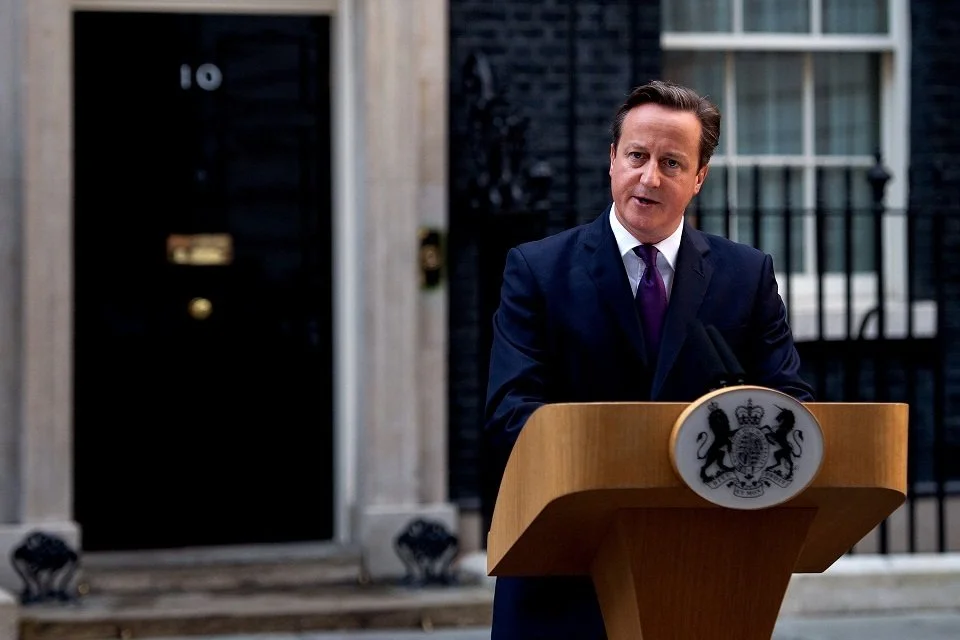The Lord of Last Resort
Photo Courtesy: UK Government, Wikimedia Commons
As with most weeks in politics, this one was far from boring. It all kicked off, of course, with the swift sacking of Suella Braverman first thing on Monday morning. The former Home Secretary’s departure was hardly a surprise—she has been a pain in Prime Minister Rishi Sunak’s backside since he first entered Downing Street. The return of David Cameron, however, was a plot-twist that shocked even the most astute political nerds, myself included.
The appointment of Cameron as the new Foreign Secretary was a bold move. Not only does it require making Cameron a Lord, with immediate effect (this is because he is no longer an MP, and all government ministers must sit in either the House of Commons or the House of Lords), but it also isolates the far right of the Conservative party. The faction, of which Braverman is a spearhead, now sits lowly on the backbenches with only junior ministers in the government. Ardent Brexiteers, small-state conservatives and family-faith-and-flag advocates will be disappointed. But, for a change, Sunak doesn’t seem to mind.
For once, he’s putting his own political beliefs above his desire to unite his party. This could be a genius move, leading to his ultimate success. Or it could all crash-and-burn, culminating in party infighting and mass electoral defeat.
Regardless of the outcome, it’s nice to see Sunak taking a stand for once. Since becoming Prime Minister, he has operated at the beck and call of his party—seeking to satisfy the right, the centre, the migrant-loathing, the lockdown-hating, the no-deal-Brexit-lovers, and everyone in between. Uniting such a divided party seemed an impossible task. Braverman’s departure might make his life in the cabinet easier, but it certainly won’t improve relations with his backbenchers.
Sunak now has a target on his back. And as the letters of no confidence threaten to trickle in, he should be wary of any Brutus-like figures trailing in his shadow.
As I say, Cameron’s return could be his saving grace. As a former state leader, he is well connected in the diplomatic world. Cameron seems the perfect Foreign Secretary during a time of grave uncertainty: from Ukraine and Gaza, to Congo and Yemen, war is very much in the air.
The new Foreign Secretary also ranks highly amongst Conservative voters in rural areas—key targets for the party in next year's election. Previous by-elections in rural seats, such as Chesham and Amersham, have seen significant defeats to the Liberal Democrats. At a time of low public trust, Cameron could be the magic wand that the party so desperately needs.
Rishi Sunak, however, shouldn’t get too far ahead of himself. After repeatedly branding his government as one of change, it seems highly hypocritical to bring back the very Conservative party leader who started the party’s thirteen-year stint in government. Granted, the leadership of the party has had a bumpy ride—the moderate days of Cameron and Theresa May seem a far cry from the whimsical Boris Johnson and the disastrous Liz Truss.
But British voters must not forget that it was David Cameron who introduced austerity and failed to adequately compensate public services once the policy had run its course. It was Cameron who seized electoral victory off the back of a long-promised Brexit referendum, before resigning with immediate-effect and leaving the Conservative party and the country both leaderless and in turmoil. It was Cameron who led Britain’s invasion of Iraq, and toppled Muammar Gaddaffi in Libya, plunging the country into chaos. It was Cameron who overstepped the line on British-China relations, and shrouded his former government in lobbying scandals.
For all his merits, Cameron hardly purports a clean record. His appointment is puzzling. On the one hand, he signals a return to the one-nation, moderate Conservatives that so deeply resonate with the majority of the British public. On the other hand, he highlights the faults and failures at the core of his party.
Cameron was the one who got us into this mess: a roller coaster of referendums, leadership races and national humiliation. Whether he’s a Lord or not, I’m not sold on Cameron’s record, and I don’t believe that the British public should be either.
Sunak was right to seek out fresh blood. But with so much talent in his parliamentary party, as well as other former political big-wigs, like Rory Stewart, another well-connected moderate without the same emotional baggage, Cameron’s appointment looks like more of a shot in the dark than a coherent strategy.
Time shall tell whether he’s really the saving grace that many believe him to be.

